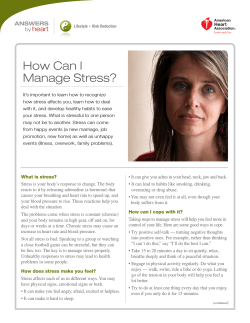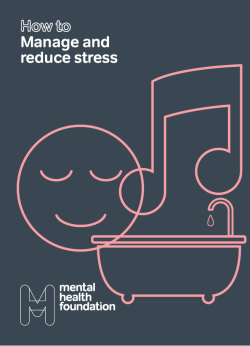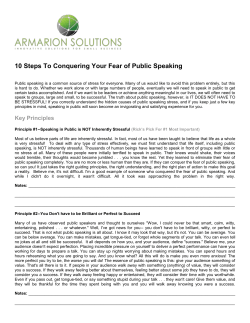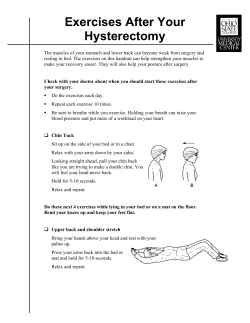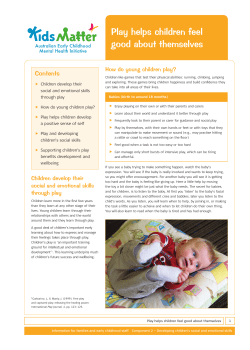
I? How Am ✔
FS-559 w o H Am A booklet about stress for kids When I feel under a lot of stress and pressure, what happens to me? Which of the following do I notice? Place a ✔ beside those that happen often. Place an ✗ beside those that occur only sometimes. Headaches I? Dizziness Face feels hot, flushed Loss of appetite Grind teeth Dry mouth or throat Neck and shoulders tighten up or ache Heartburn Back tightens up or aches Heart beats faster Diarrhea Legs get shaky or tighten up Tapping fingers or feet Stomach upset or nausea Cramps Hands or feet feel cold or sweaty This booklet can help you become aware of the effects stress has on your life and help you learn to cope with stress. Stress is a term often associated with the rushed businessperson or the athlete who needs to make the winning shot. Many people forget that young people also experience stress. You may think stress has little to do with your life. But have you ever tried out for a team, taken a test, competed for an award or changed schools? All of these events can produce stress. Stress can be positive or negative. Positive stress pushes you to complete a task or do something. Negative stress gets in the way and puts demands on your mind and body. Learning to deal with these demands is what this booklet is all about. Stress is your body’s physical and emotional reaction to circumstances that frighten, irritate, confuse, endanger or excite you. Stress isn’t all bad; it’s really very necessary in life. Your body sets its defenses and protects itself against danger. Each time your body senses danger or the unknown, your nervous system reacts by getting ready for “fight or flee.” This “fight or flee” response is normal and present in living things. An average amount of stress can give you that extra burst of energy needed to finish the last mile of a bike ride or make you mentally more alert to pass an exam. 2 Thousands of years ago, this stress response was vital for survival. Our early ancestors lived in a brutal world where sudden, unthinking responses helped them “fight or flee” dangers like saber-toothed tigers and forest fires. Today, this same body response works well when you are faced with similar stressful situations such as running from a vicious dog or avoiding being hit by a car. Most threats today, however, are much less obvious than saber-toothed tigers. Your threats include things such as tests, conflicts with parents and relationships with friends. Your body responds in the same chemical way it would have reacted to the saber-toothed tiger long ago— your muscles tense, your heart pounds, you breathe faster. Although your body is supercharged, there is often no direct way to “fight or flee” the situation. These long-term effects of stress can add up and do real damage to your body. 3 s e c r Sou of Stress Some stress is bad, some is good. The list of stressful situations below contains both types. Go through it, and check off each event that has happened to you within the past year. Also mark whether you felt good or bad about it. Check only events you actually experienced Event This Happened to Me Doing something I was not comfortable with because of peer pressure Making new friends Being accepted by kids at school Fighting with a friend Wearing the right clothes, shoes, jackets Not getting along with my brothers or sisters Worrying about money Death of a close relative or family member Being left out Change in family income Not being good at sports, piano, dance, spelling, math Trying hard but still failing 4 The Effect It Had on Me (Good or Bad) Event This Happened to Me The Effect It Had on Me (Good or Bad) Parents giving me too many jobs and responsibilities Parents didn’t listen to me Death of a friend or classmate Speaking up in class Having adults expect too much from me Joining a new after-school activity Changing schools Classmate or friend committed suicide Threat of violence at school Divorce of parents Parents separated Personal injury or illness Gained a new family member (baby or stepfamily member) Change of someone’s health in my family Arguments with my parents Arguments with my brothers or sisters Moving Having trouble with a teacher Vacationing Any one of these events is probably stressful. If you checked several that made you feel bad, you may be feeling a stress overload. 5 s Are Thing times Some This quiz will help you explore your reactions to stress overload. There are no right or wrong answers, so read through the list and check those that apply to you. This will help you determine your level of stress. Score Scale 6 or more = stress level quite high 2 to 5 = stress level average 1 or 0 = stress level below average Just Too Much? 1. 2. 3. I often fee l tense, a nxious, up set. ......... I have a n ❏ ervous sto mach. ..... ............... People in ❏ my family o me feel u pset. ........ ften make ................. 4. People at ................ ❏ school ofte ne rvou s. n m ak e m .................. e feel ................. 5. I get head ............... ❏ aches a lo t. ... .. ... ................. 6. I often ha ... ❏ ve 7. I worry ab trouble sleeping. ................ ❏ ou and on we t school, even at night eke 8. I find myse nds. .................................. ❏ ne rvou s. lf eating a lot when ........ Ig 9. I have tro ...................................et....... ❏ ub because I’m le concentrating o n else. ........ worrying about so things ................. m .................. ething 10. I conside .............. ❏ r dr to relax. ... ugs, smoking or dr ................. inking .................. 11. I have a lo ............. ❏ t of things done by ce that have to be rtain time at home. s .................. at school or ................. 12. I have tro ............... ❏ uble findin g tim e to relax. ... 13. When I d .... ❏ oh because I ave time to relax, I can’t rela feel guilty my homew th x ork or oth at I’m not doing er chores . .............. ❏ Reactions to Stress Common reactions to stress include: Crying Depression Restlessness, fidgeting Feeling tired or exhausted Withdrawing from people Aggression Boredom Unable to concentrate Sleep or go to bed to escape Unable to sleep Irritable or moody 6 Feelings Related to Stress Describe a time when you felt... Nervous/Anxious Shame Guilt Fear Jealousy/Envy 7 s s e r t S Safety Valves Stress safety valves can include: Sometimes a break or a change from a stressful situation helps you to return refreshed and ready to handle a problem. Everyone needs to have a stress safety valve—a way to relax or take a break from a stressful situation. ss your stre e r a t a h W lves now? safety va • Spend some time alone. • Take a walk. • Listen to music. • Talk or play with little kids. • Care for your pet. • Work on your favorite hobby or start a new one. • Sing with a group of people. • Bake or cook something special. • Play a musical instrument. • Jog, dance, play basketball or join in some physical activity you enjoy. • Watch the sun rise or set, or watch the night sky. Think of t stress s hree more a that you fety valves can use. • Play just for fun instead of to win. • Smile at someone. • Tackle one task at a time. Make a list of what you want to do and then start with the first task. • Talk to someone who listens or someone who will help you explore your alternatives. 8 s ie t i iv t c A t o Re l i e When you feel stressed and don’t want to talk it out or walk it out, consider the following paper options. ve Stress The Letter If you are angry with someone or hurt or frustrated, write that person a letter. You don’t have to send it. Writing down your thoughts and feelings will help get them off your chest and clear your head to think of solutions and other positive ways to tackle problems the next time you encounter them. If you do choose to send a copy of the Dear Dia ry letter, make sure it offers T h is is a positive solutions, not blame track of nother way to k or threats. eep your t houghts feelings with the without sharin and g diary or other person. U them journal t s emotion o figure ing a s o be very and solutions ut p P.S. Be ositive and priv can sure to solution share t ate. s y o u come he to impro up w v e everyon the situatio ith e involve n for d. 9 Activities Fold It Make a hat, a paper ship or a whole outfit. Rip paper into strips just to shred or paper mache’. Check out a book on origami and really put your frustrations to work folding and creating. People feel better when they have a skill to share that is different than anyone else’s. Draw It Out If you enjoy drawing when you’re feeling relaxed, keep the markers handy and draw when you’re feeling stressed. Perhaps you can draw the blues right out of you. Crumple It Up Feeling really unmotivated? Crumple up some newspaper, one page at a time. As you crumple, think about something you worry about then throw the worry at a trash can or other acceptable target. Be sure to clean up the room when you’re through or you’ll have something else to worry about. 10 to Relie ve Stress Relaxation Ideas k c i Qu Counting 10 Breaths Back ody Whole B Tension 1. scles in the mu old that ll a e s y. H Ten ole bod s you can h w r u yo ng a n as lo pain. tensio g n t feeli withou sion the ten dy e s a le r bo ly re 2. Slodwfeel it leave you an little. little by times. t three a e p e ls. 3. R this fee w o h e rib 4. Desc Shoulder Shrug 1. Try to raise your shoulders up to your ears. 2. Hold for the count of four, then drop your shoulders back to normal position. 3. Repeat as often as necessary until you feel relaxed. 4. Change this by rotating your shoulders back, down and around—first one way, then the other, then both shoulders at the same time. 1. Allow yourself to feel calm and relaxed. Count each breath slowly from 10 to one. 2. With each count, allow yourself to feel more relaxed. 3. With each breath out, allow the tension to leave your body. Alternat Breathin e Nostril g 1. Block y our one han left nostr il wit h d through and inhale dee yo ply five sec ur right nostr il onds. for 2. Block both breath fo nostr ils, holdin g your r five se conds. 3. Repea t, b breathin eginning this ti m g throug h the le e by nostr il. ft 11 W h er e T o Go For Help Fill in the ph one numbe rs importan t to you. Home Parent’s wor k School Teacher Principal Counselor Minister/Cle rgy Mental Heal th HELP-LIN E County Soc ial Services Local Hotlin e Emergency (800) 472-2 911 help Anorexia an dB ulimia Inform ation Drugs and A lcohol Habili tat Hotline Heartview F oundation (chemical de pendency) Multipurpose (Covenant H ouse) Poison Cent er (800) 999-9 999 Prevention (800) 732-2 200 Resource C Protection & enter Advocacy P Runaway H otline Suicide Pre vention & Survivors o f Suicide (800) 872-2 525 (800) 554-2 000 (800) 642-6 744 roject (24-hour em ergenc (800) 472-2 911 (800) 472-2 670 y) (800) 642-6 694 (800) 621-4 000 (800) 472-2 911 12 Work It Out! Example ress log t s y il a d Time 7:00 Activity room out of bath e m o c ’t Sister won y shoe Dog ate m 8:00 8:10 12:45 Bus is late ch money Forgot lun st on math te Got a Con bus d names Was calle 1:30 3:30 lt How I Fe angry panic! anxious frustrated ted disappoin sad Daily Stress Log Activity Time 13 How I Felt Work It Out! Complete the following sentences. As you write, remember that everyone has these feelings. Feelings are not good or bad or right or wrong. They may be pleasant and unpleasant, but that’s normal. I feel happy when I become angry when I am sad when I feel lonely when I become frustrated when I hate it when I get anxious when 14 Work It Out! Example Situation How did I react? How did I feel? What happened because of my actions ? What could I try next time? My sister didn’t come out of the bathroom. Pounded on the door and yelled, “Get out!” Angry My parents grounded me. Get up earlier. Ask. Sch edule for turns. Shower the night before. Blow dry my hair in my bedroom. Situation How did I react? How did I feel? What happened because of my actions? What could I try next time? 15 Sean Brotherson Family Science Specialist Reference: Chase, C. (1981). “The Stress Connection.” Cooperative Extension Service, Michigan State University, National 4-H Council. NDSU Extension Service, North Dakota State University of Agriculture and Applied Science, and U.S. Department of Agriculture cooperating. Sharon D. Anderson, Fargo, North Dakota. Distributed in County commissions, North Dakota State University and U.S.Director, Department of Agriculture cooperating. furtherance of State the Acts of Congress May 8 and Juneon30, offer our programs facilities to all North Dakota University doesof not discriminate the1914. basisWe of race, color, nationaland origin, religion, persons regardless race, color, national origin, sex, disability, age,status, Vietnam veterans status, sex, disability, age, of Vietnam Era Veterans status,religion, sexual orientation, marital or era public assistance or sexual orientation; are Chief an equal opportunity employer. status. Direct inquiriesand to the Diversity Officer, 205 Old Main, (701) 231-7708. This publication will This publication willinbealternative made available alternative format to people withrequest, disabilities upon request (701) be made available formatsinfor people with disabilities upon (701) 231-7881. 231-7881. March 2009 10M-1-94, 10M-3-94, 5M-8-94, 20M-12-95, 10M-3-98
© Copyright 2025
